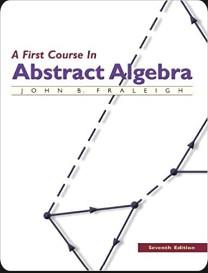Give a two- or three-sentence synopsis of Theorem 29.3. Data from Theorem 29.3 Let F be a
Question:
Give a two- or three-sentence synopsis of Theorem 29.3.
Data from Theorem 29.3
Let F be a field and let f(x) be a nonconstant polynomial in F[x]. Then there exists an extension field E of F and an α ∈ E such that f(α) = 0.
Proof By Theorem 23.20, f(x) has a factorization in F[x] into polynomials that are irreducible over F. Let p(x) be an irreducible polynomial in such a factorization. It is clearly sufficient to find an extension field E of F containing an element α such that p(α) = 0. By Theorem 27.25, (p(x)) is a maximal ideal in F[x], so F[x]/(p(x)) is a field. We claim that F can be identified with a subfield of F[x ]/(p(x )) in a natural way by use of the map ψ : F → F[x]/(p(x)) given by ψ(a) = a + (p(x)).
for a ∈ F. This map is one to one, for if ψ(a) = yr(b), that is, if a + (p(x)) = b + (p(x)) for some a, b ∈ F, then (a - b) ∈ (p(x)), so a - b must be a multiple of the polynomial p(x), which is of degree ≥ 1. Now a, b ∈ F implies that a - b is in F. Thus we must have a - b = 0, so a = b. We defined addition and multiplication in F[x]/(p(x)) by choosing any representatives, so we may choose a ∈ (a + (p(x))). Thus ψ is a homomorphism that maps F one-to-one onto a subfield of F[x]/ (p(x)). We identify F with {a+ (p(x)) | a ∈ F} by means of this map ψ. Thus we shall view E = F[x]/(p(x)) as an extension field of F. We have now manufactured our desired extension field E of F. It remains for us to show that E contains a zero of p(x).
Let us set α = x + (p(x)), so a ∈ E. Consider the evaluation homomorphism ∅α : F[x] → E, given by Theorem 22.4. If p(x) = a0 + a1x + · · · + anxn, where ai ∈ F, then we have ∅α,(p(x)) = a0 + a1(x + (p(x))) + · · · + an(x + (p(x))n in E = F[x]/(p(x)). But we can compute in F[x]/(p(x)) by choosing representatives, and x is a representative of the cos et a = x + (p(x)). Therefore, p(α) = (a0 + a1x + · · · + anxn) + (p(x)) = p(x) + (p(x)) = (p(x)) = 0 in F[x]/(p(x)). We have found an element α in E = F[x]/(p(x)) such that p(α) = 0, and therefore f(α) = 0.
Step by Step Answer:






